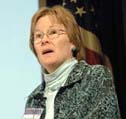|
|
 |
 |
|
 |
 |
 |
 |
 |
   |
|
December 12, 2008
Retreat Refreshes Behavioral, Social Sciences
 Dr. Christine Bachrach
Dr. Christine Bachrach
Dr. Christine Bachrach, acting director of the Office of Behavioral and Social Sciences Research, wanted just one thing out of the first-ever day-long retreat for NIH’s widely dispersed community of behavioral and social scientists, held Nov. 12 at Natcher Bldg.
December 12, 2008
CBT4CBT
New Hope for Treatment of Addiction
 Dr. Kathleen Carroll
Dr. Kathleen Carroll
Drug addiction is notoriously tough to treat, but now research is showing a fresh way to tackle the problem. It’s called computer-based training for cognitive-behavioral therapy (CBT4CBT)
OBSSR’s Mabry Wins with Systems Analysis Team
 OBSSR’s Mabry Wins with Systems Analysis Team
OBSSR’s Mabry Wins with Systems Analysis Team
More News >>
|
  |
|
January 28-29, 2009 Dissemination and Implementation Conference
February 9, 2009, 10:00 – 11:00 AM
Stigma: Lessons & New Directions from a Decade of Research on Mental Illness
July 12-24, 2009
OBSSR/NIH Summer Training Institute on Randomized Clinical Trials Involving Behavioral Interventions
May 3-8, 2009
Institute on Systems Science and Health
May 22-25, 2009
Gene-Environment Interplay in Stress and Health at the Association for Psychological Science 21st Annual Convention, San Francisco, CA
More Events >>
|
|
|
 |
 |
 |
 |
|
Home > Training and Education > Behavioral and Social Science in Medical School
|
Behavioral and Social Science in Medical School |
|
Despite the fact that a majority of health problems have significant behavioral and social roots, the behavioral and social aspects of health and training in behavioral health interventions have rarely been a focus within the standard medical school curriculum. In response to this need, OBSSR and the Robert Wood Johnson Foundation commissioned an Institute of Medicine report, Improving Medical Education: Enhancing the Behavioral and Social Science Content of Medical School Curricula (published in 2004).
The report includes three core recommendations:
- Integrate behavioral and social science topics into the mainstream curriculum. The report recommended six specific curriculum topics, including mind-body interactions, physician-patient communications skills, and social/cultural factors in health behavior change.
- Develop a new national behavioral and social science curriculum database, as part of the the Association of American Medical Colleges (AAMC)’s standard Curriculum Management and Information Tool (CurrMIT).
- Create career development and curriculum development awards for behavioral and social science to reward excellence in teaching these subjects within medical schools.
OBSSR issued a Request for Applications ( RFA-OD-05-001) and is supporting nine awards totaling $1.5 million per year for FY 2005 to FY 2010. These innovative K07 awards are allowing the nine medical schools, which are voluntarily collaborating with each other, to develop, implement, evaluate, and disseminate improved behavioral and social science curricula. This initiative should improve clinical knowledge and skills for medical doctors enabling them to address behavior-related health conditions.
|
|
|
 |
 |
 |
 |
|
|
 |
 |
 |
|
 |
 |
|
|
|
|